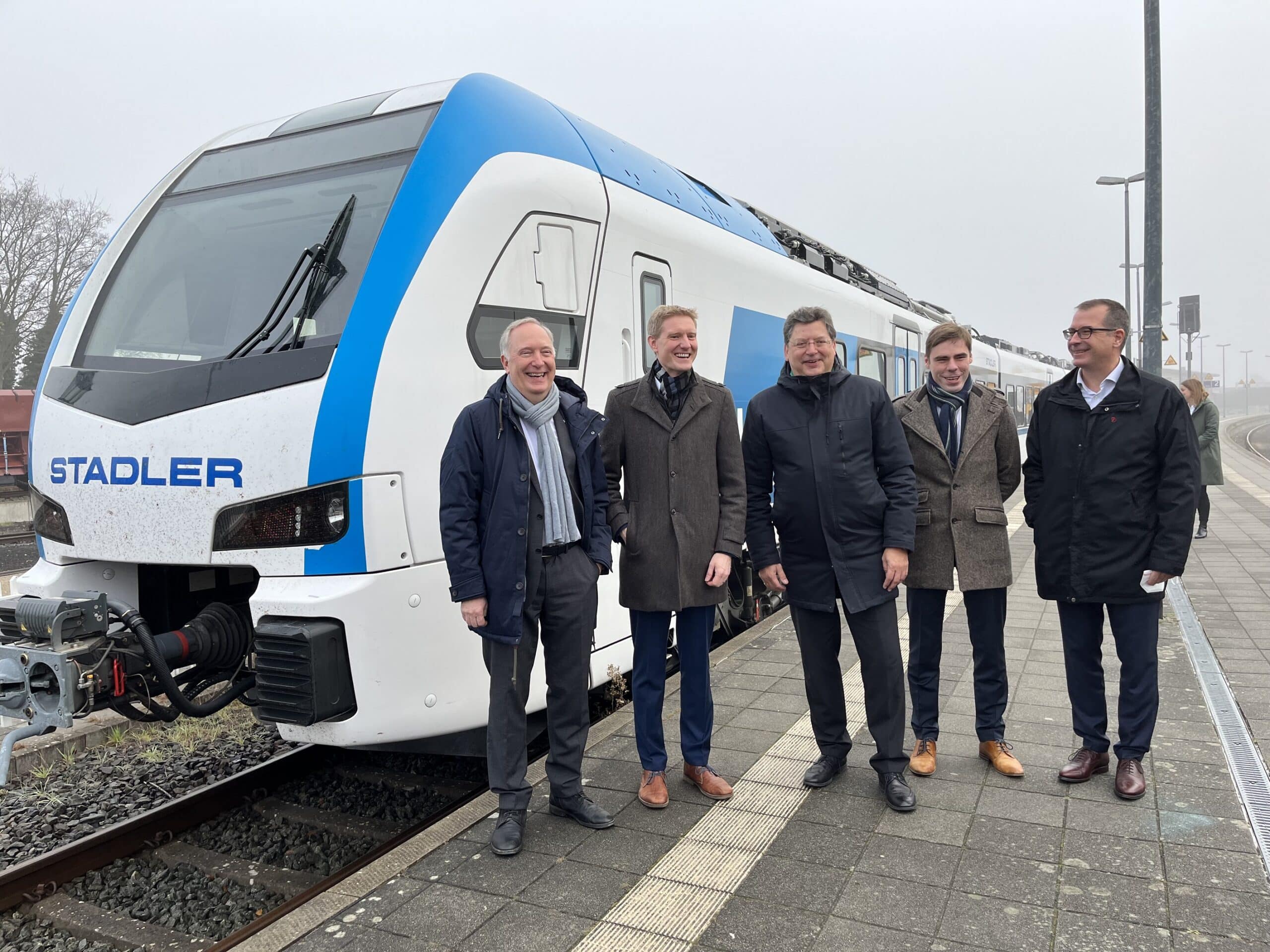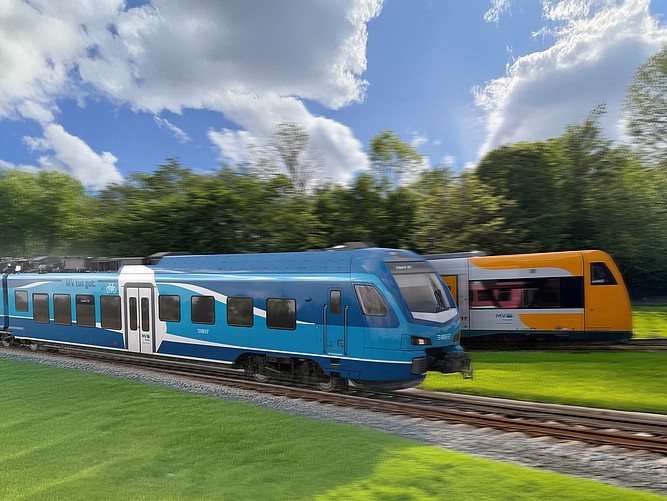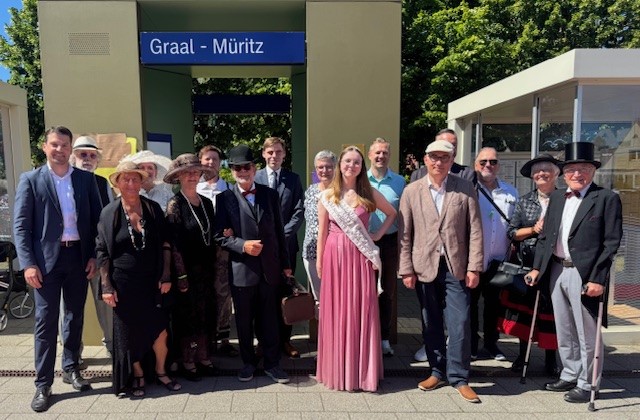Rostock, 25.11.2022 The state of Mecklenburg-Vorpommern and Deutsche Bahn (DB) are taking the next step towards emission-free, climate-neutral rail transport. For the first time, DB Regio in Mecklenburg-Western Pomerania will use battery trains on current diesel lines in the Warnow II network.
Reinhard Meyer (Minister for Economic Affairs, Infrastructure, Tourism and Labour of Mecklenburg-Western Pomerania) started today at Rostock main station together with Daniel Bishop (Authorised signatory, Head of Department Transport Economics and Digitalisation of Verkehrsgesellschaft Mecklenburg-Vorpommern mbH), Alexander Kaczmarek (DB Group representative for the states of Berlin, Brandenburg and Mecklenburg-Western Pomerania) and Jure Mikolčić (CEO of Stadler Deutschland GmbH) for a test drive with the test and trial vehicle of the manufacturer Stadler.
The area of operation of the 14 trains in total will be the Warnow II network with the RB11 (Wismar - Rostock - Tessin) and RB12 (Bad Doberan - Rostock - Graal-Müritz) lines from the end of 2026. DB Regio was awarded the contract for the network in February. Stadler's battery trains are a particularly sustainable alternative for local transport. Direct connections between electrified and non-electrified line sections can be operated continuously and emission-free.
Reinhard Meyer, Minister for Economic Affairs, Infrastructure, Tourism and Labour: "We are taking the next step in the diesel phase-out towards largely emission-free rail transport in Mecklenburg-Vorpommern. The replacement of diesel multiple units with vehicles with climate-neutral drives is a step towards the complete decarbonisation of local transport. Battery trains are an attractive bridging technology, especially if the route network does not have an electric overhead line. We need affordable mobility with long-term perspectives, an expanded rail infrastructure here in the country, this must be promoted and developed. Strengthening the railways protects the climate and strengthens public mobility in cities, surrounding areas and rural regions. We are working on this with all those involved.
Alexander Kaczmarek, DB Group Representative for the States of Berlin, Brandenburg and Mecklenburg-Western PomeraniaWe are pleased to be able to work together with the state on the Warnow II network to put a battery-electric vehicle fleet on the rails in Mecklenburg-Western Pomerania. Today, we are moving a step closer to our goal of being climate-neutral by 2040 as Deutsche Bahn. Battery technology is also new for our Rostock workshop and secures many qualified jobs and apprenticeships in the region."
Jure Mikolčić, CEO Stadler Division Germany: "With the FLIRT Akku, Stadler is making an ecological and innovative contribution to the transport turnaround. Over the duration of the transport contract of 13 years, the use of battery-electric trains will save 35 million kilograms of CO2. At the same time, battery-electric vehicles are quieter and also more economical than diesel vehicles due to their lower energy consumption and cheaper maintenance costs."
In addition to the energy-saving and climate protection effect, the Stadler trains offer a total of 99 seats and twelve bicycle stands. WLAN and power sockets ensure a high level of travel comfort. A video-monitored passenger area and modern passenger information provide safety and orientation. Accessibility is a matter of course: the vehicles have a wheelchair-accessible toilet and designated wheelchair areas. The trains are very energy-efficient due to their lightweight aluminium construction and reach a maximum speed of 140 kilometres per hour.
DB is already using alternative drives (battery or hydrogen trains) and fuels in Bavaria, Baden-Württemberg and Hesse, among other places. It is thus making an important contribution to climate protection by replacing diesel vehicles and reducing CO2 emissions by a third. For bridging non-electrified railway lines, DB also relies on overhead line islands, as in Schleswig-Holstein. Another contribution to reducing CO2 emissions is the training of train drivers in energy-saving driving techniques.
For more information, see: www.deutschebahn.com/mp-gruen and www.deutschebahn.com/gruen
About the FLIRT battery from Stadler:
The world record train
The FLIRT Akku is the battery-powered version of Stadler's FLIRT type series. The operational range of the vehicle is around 100 kilometres. This means that 80 per cent of Germany's non-electrified routes can be travelled with the regional train in battery operation. With 224 kilometres travelled in pure battery mode, the FLIRT Akku holds the world record for the longest journey by a regional train in pure battery mode without additional charging. In addition to the purely electric and battery-electric variants, Stadler also offers the FLIRT with hydrogen. Stadler is developing the first hydrogen-powered FLIRT for the American San Bernardino County Transportation Authority (SBCTA).






